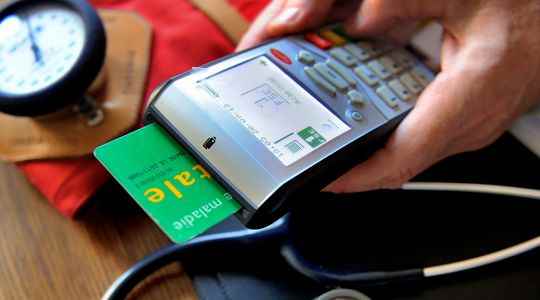With a slight ignition delay, due to the fifth wave of Covid-19, the device seems to be on track. Olivier Véran must press the button this Thursday, to trigger nothing less than a “new revolution” in the health system, comparable to the deployment of the Vitale card a quarter of a century ago, according to the invitation sent to the press by the Ministry of Health. The government is officially launching “My health space”, a new digital public service integrating computerized medical records. “A new public service available to all French people and which will allow them to store and access their health data in complete confidence and in complete security”, explains the executive. “A confidential code will be sent to each insured, by e-mail or by post”, reports the site Ameli.
- Why is this a small “revolution”?
This device that governments have failed to impose for fifteen years will now be created automatically for each insured – regardless of their health insurance plan. Farewell to the acronym DMP – for personal medical record. Make way for “My health space”, supposed to break the bad luck, even if its launch with great fanfare has already been delayed by a month.
Operational since January 1, this public service available in the form of a website – pending the app for smartphones – should allow “all French people to store and access their health data in complete confidence and in safe”. Thus, “My health space” will be available in the form of a website monespacesante.fr, via computer or smartphone. A dedicated mobile application version for smartphones and tablets will be launched in the coming months.
- What can we do via “My health space”?
Prescriptions, hospitalization reports, analysis results… All medical documents are intended to be found there, at the initiative of the caregivers or the insured person himself, who can also provide information on his vaccines, allergies and ongoing treatments.
Everyone will also have secure messaging to exchange information with their healthcare professionals, and a diary to manage their medical appointments. Basic services which will be supplemented by a “catalogue” of applications referenced by the public authorities, for example for the monitoring of chronic diseases, teleconsultation or prevention.
- Is it possible to refuse this device?
The “revolution” plans to be rapid: by the summer, some 68 million French people – including children – will automatically be provided with a “health area”, unless they take the step of refusing it . To do this, you will have to use the “provisional code” received by email or by post, valid only for six weeks. After this period, it will still be possible to close your “health space”, but your data will remain archived for ten years by the Health Insurance.
This so-called “opt-out” logic contrasts with the previous versions of the DMP, based on voluntary membership, whose limits were right. As a reminder, the counter stopped at 10 million in mid-2021, far from the target of 40 million by 2023, displayed by the executive at the start of the five-year term.
- What about the security of our data?
The government affirms it: it has done what is necessary to guarantee maximum security around the health data which is stored in “My health space”. Thus, the servers hosting the data are based in France. Two companies Worldline (through its subsidiary Santeos) and Atos will be responsible for hosting the data from “My health space”. These companies are both certified Health Data Hosts (HDS), in accordance with Article L. 1111-8 of the Public Health Code.
“My health space preserves medical secrecy, since it is the user who decides which health professionals can have access to his documents and the documents he agrees to share”, specifies the Ameli site.
- Is there any reluctance around this new device?
After fifteen years of failures and repeated reminders, “some proactive actions were needed”, told AFP the president of France Assos Santé, Gérard Raymond, a supporter of this “form of empowerment of citizens”. Its federation of patient associations insists, however, on “proximity support for users”, in particular those who risk “finding themselves in difficulty with digital tools”: old, poor, rural, disabled, migrants…
The communication effort of the authorities will be decisive. The pilot phase carried out last year – in the middle of summer – in three departments (Haute-Garonne, Loire-Atlantique, Oise), is proof of this: less than 0.7% refusal, out of 3.3 million insured . A Soviet score which attests to a “forced passage” and a “denial of the right of patients to free and informed consent”, is offended by the Syndicate of General Medicine (SMG), a very minority in the profession.
Despite its planned generalization, “My health space” is not immune to a new fiasco, if the files created remain abandoned empty shells. Installed near Toulouse, Dr. Jean-Louis Bensoussan “used very little” during the experiment. Moreover “no patient has offered it to me”, adds the secretary general of MG France (main organization among liberal general practitioners), who says he has received “very little information” on this tool of which he “has no not necessarily needed”.
